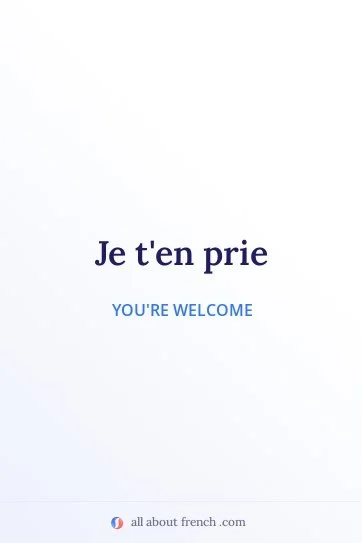
Are you ready to discover all the things you want to know about the basic sentence "Je t'en prie"? To be more specific, it includes a full guide of what it is and how you can use it in everyday life with an audio example.Additionally, we also added super useful stuff like slow pronunciation audio, synonym, dialogue example and more!
Translation : You're welcome
Register : Neutral - Basic
Slow
Normal
IPA : / ʒə tɑ̃ pʁi /

"Je t'en prie" is used very often in daily life and is one of the most popular ways to express "You are welcome" in French. The most classic way is "De rien", so if you have to keep in mind just one use "De rien" instead which will work in every situation.
The only difference with "De rien" is that "Je t'en prie" is more formal.
But keep in mind that to sound like a true French you will need to master these variations and use them appropriately depending on context, whom you are talking to and how much you want to be polite.
Let's see a few examples!
A very basic example: you do something for someone and the person says: "Merci" (Thank you). Then you answer: "De rien" (You are welcome) or "Avec plaisir" (My pleasure) or “Je t'en prie”
But now let's take the same situation and change it a little. The person who says "Merci" is your boss and you want to show some extra respect, so you can use instead: "Je vous en prie" (Literally: "I beg of you").
Another case: the person is now your sibling/family or a close friend. No need to be formal anymore, right? So you can use instead: "Pas de quoi" (That's nothing) or "T'inquiète" (Don't worry) or "Pas de souci" (No worry).
Finally, imagine you think you don't deserve the "Thank you" or you think the other person is actually the one to thank. In this case you can use an expression to redirect the "Merci" toward the other person.
Examples: "C'est moi qui te remercie" → "No, I am the one who thank you" (Informal) or "C'est moi qui vous remercie" (Formal). Other options would be: "Tout le plaisir est pour moi" → "All the pleasure is for me" (Neutral) or "Merci à toi/vous" → "Thanks to you". (Informal/Formal)
Check the variations below to find the most appropriate ones regarding your situation!
In France, the variations you can use are:
In other French-speaking countries, you can also use:
↓ Example in a story with translation ↓
Finally, let's see an example in a parallel story with slow audio.
Le Français, c'est compliqué
French is complicated
10%
The story just started!
Get full access to 365 texts and quizzes, including this one.
 Discover more
Discover more Already a member? Full story and quiz here.
